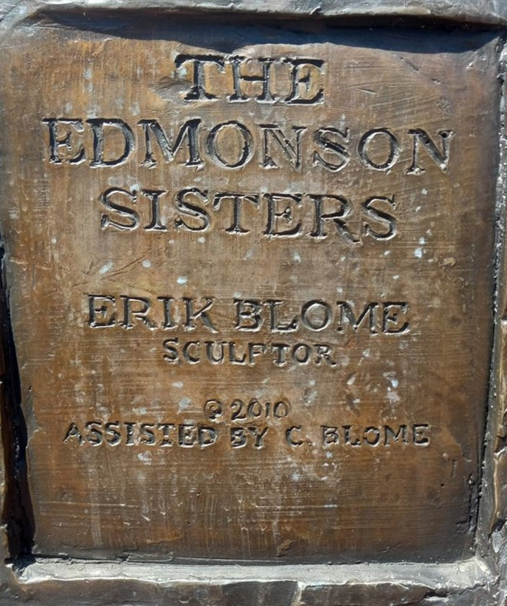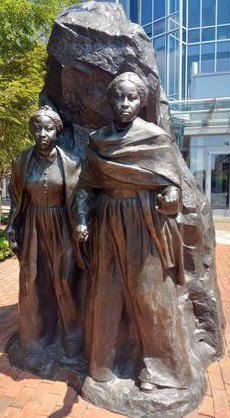Memorials are a form of art that serves the purpose of preserving the events of the past. However, beautiful or petrifying, it is often worth to be displayed, allowing society to pay its respect and work hard towards ensuring that history does not repeat itself. The history of enslavement that Black people of America were forced to live through is a subject that should be remembered. Such a beacon of hope for the better and a symbol of freedom from slavery is The Edmonson Sisters sculpture located at 1701 Duke Street in Alexandria, Virginia.

The Sculpture
The Edmonson Sisters Memorial was commissioned in 2007 by a Washington development company, Carr Properties. The monument was built behind the Bruin Slave Jail, highlighting the site’s history and drawing attention to the sister’s story (Ater 218). The artist chosen to bring this piece of history to life was Erik Blome, who has already had experience in commemorating African American culture (Ater 218). His portfolio includes such works as memorials to Washington Carver, Rosa Parks, and Martin Luther King Jr (Ater 218). By 2010 he introduced two sisters cast in bronze.

The sculpture depicts Mary and Emily Edmonson emerging from a large boulder while holding hands. The sister’s likeness was cast according to different historical sources, wearing 19th-century work dresses; their faces demonstrate solemnity and dedication (Ater 218). The boulder is considered to represent the darkness of slavery and imprisonment, which the two brave souls leave behind. The girls differ in height; the taller, being the older one, gestures forwards, showing the way out of the darkness.
The History
The symbolic image of the memorial enchants anyone unfamiliar with the story behind the sisters’ emancipation to educate themselves and shed light on the horrors of the past. Having been born to a freedman father and a slave mother, Mary and Emily were bound by the Maryland law to inherit their mother’s status (The Edmonson Sisters). Hoping to escape such a tragic fate, the teenager boarded the Pearl, a ship destined to free 77 black people by sailing to New Jersey (Labbe 5). Unfortunately, the attempt was unsuccessful; they were brought back, transferred for sale in New Orleans, and stored in Alexandria (Labbe 5). They were intended to serve as sex slaves; however, thankfully, their father worked tirelessly to be able to afford their freedom.
Seven months after boarding the Pearl, in 1848, Mary and Emily were emancipated. Having experienced the horrors of slavery, they spent the rest of their lives advocating for the abolitionist movement. They received education and worked hard to free their brothers; however, only Emily got to get old. She and her husband became the founding member of the Hillside community in Anacostia (The Edmonson Sisters). Having lived through much, the girl attained their freedom and helped liberate others.
Having learned the story behind the sisters’ emancipation, the work done by Erik Blome can be truly appreciated. The gestures, determination, and ever-present darkness surrounding Emily and Mary in the memorial perfectly depict the hardship they were forced to overcome. It is truly horrifying to realize how much history was indifferent to the lives of Black people and children especially. Mary and Emily were 15 and 13 years old, yet they were ready to sail away to the unknown in their pursuit of freedom. They were considered cargo and investment, but never living, breathing human beings that they were. This is the ugly history that needs to be remembered.
Works Cited
Ater, Renée. Traces and Memories of Slavery in the Atlantic World. Routledge, 2019.
Labbe, Savannah. “A Hidden History: Alexandria’s Slave Pen and the Domestic Slave Trade.” The Gettysburg Compiler: On the Front Lines of History, vol. 329, 2018.
The Edmonson Sisters: A Triumph of the Human Spirit. Zebra, 2022, Web.